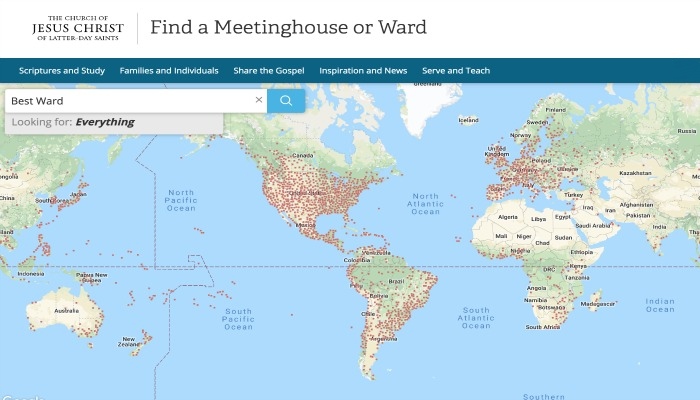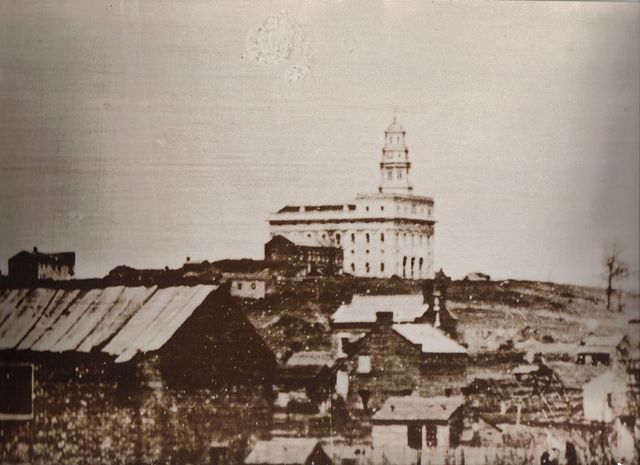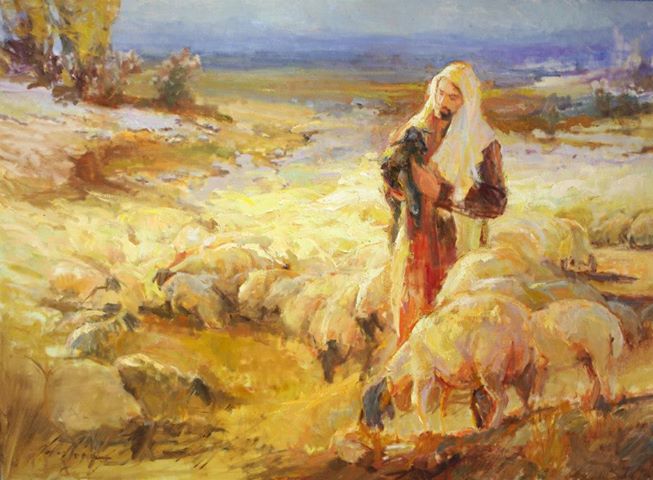
If you ask someone who is not a member of the Church what comes to mind when they hear the word “ward” they will probably do a word association and respond with “psych ward.” Modern vernacular assigns the word ‘ward’ to a subdivision within a hospital. Why then does The Church of Jesus Christ of Latter-day Saints call its congregations wards?
Let’s go back to the very beginning. A very good place to start.
Are Geographically Based Churches Outdated?
 You might recall that the early church spent some time in Nauvoo, Illinois. It was at this point that “ward” became a religious term. In Illinois, “wards” were political subdivisions used to divide up the electorate. The boundaries of these divisions were used to break the early church up into more manageable sized groups of worshipers. Bishops were given responsibility and assignments over ward boundaries. When the Church moved to Utah this system was maintained.
You might recall that the early church spent some time in Nauvoo, Illinois. It was at this point that “ward” became a religious term. In Illinois, “wards” were political subdivisions used to divide up the electorate. The boundaries of these divisions were used to break the early church up into more manageable sized groups of worshipers. Bishops were given responsibility and assignments over ward boundaries. When the Church moved to Utah this system was maintained.
Related: Can Members change which ward of the Church they attend?
Catholics also worship according to geographic congregations. Polling reveals that the majority of Catholics believe that people should be able to attend whatever congregations they choose. Those same polls show that a vast majority think that geographic regions are outdated. Do we feel similarly? Why do we still utilize the ward system?
Benefits
 There are real benefits to organizing Church members geographically. Having all of the members of a given ward within relatively close proximity to each other offers the soundest method for providing temporal support, ministering, and fostering relationships.
There are real benefits to organizing Church members geographically. Having all of the members of a given ward within relatively close proximity to each other offers the soundest method for providing temporal support, ministering, and fostering relationships.
In the early history of the Church, the Lord commanded the Saints — “organize yourselves” and prepare a “house of order” (D&C 88:119). Organization is a fundamental concept in the kingdom of God, and having local wards and stakes assists in giving us the order which the Lord desires.
It’s hard to argue against the logistical benefits of organizing geographically as it pertains to helping others in the event of a natural disaster or other temporal complexities which may arise. The Church has been lauded across the world as being one of the first responders, one of “the best organized and most efficient” following an emergency.
Much of this can be attributed to the organizational structure within The Church, starting at the local level, where Church leaders overseeing stakes and wards are able to swiftly and seamlessly enact a plan which will be most effective for helping those in distress.
Catholic Father Michael Enright defended gathering in geographical groups as well in saying:
The people of God build up a dense web of relationships over time that sustains them and helps them pay attention to what is really important—that is, their connection to each other and to the Lord.
Indeed, worshipping amongst our neighbors allows us to develop a “dense web of relationships” which will profit us both in this life, and the life to come. Recently, we have seen the leaders of the Church place an even greater emphasis on creating unity among Church members. The starting place to engender this unity and Christlike love begins with those individuals who live in our neighborhoods, attend the same schools, and those with whom you already interact.
A couple of scriptures help illustrate the positive effects which gathering together and unifying as one body can have within the Church.
And the Lord called his people Zion, because they were of one heart and one mind, and dwelt in righteousness; and there was no poor among them (Moses 7:18). And that the gathering together upon the land of Zion, and upon her stakes, may be for a defense, and for a refuge from the storm, and from wrath when it shall be poured out without mixture upon the whole earth (D&C 115:6).
While no local ward will be perfectly unified and “Zion-like,” Heavenly Father promises that if we gather together we will receive greater protection from the adversary. The old adage, “strength in numbers” applies well here. A collective body of Saints working together locally, building up the Church where they live will receive wonderful blessings which may not be obtained if we were to all split up and worship wherever the wind blew us.
Preventing Priestcraft
What a relief it is that wards and callings have nothing to do with popularity. If popularity were requisite, or even evident in the church, there would be big problems. Competition is not, or at least shouldn’t be, the driving force of Christian worship. Competition is instead paramount for the Devil’s counterfeit system known as priestcraft. By being organized into geographic ward units we avoid becoming just another ‘destination church’ where parishioners practice their faith only in congregations where the oration is ornate and the music is miraculous.
The geographic construct of wards prevents Church leaders from competing against other congregations for popularity.
Perfect In Theory

When you are looking to move you may find yourself visiting the ward that you might be moving into. Why would someone do this? To see if they have reverent sacrament meetings, or have solid gospel doctrine teachers. We might look to see how large their youth groups are. We may even restrict our homebuying efforts to a particular ward’s boundaries.
Related: Are there wards and stakes in the Spirit World?
Why does a given characteristic of a ward matter so much to us? In theory, every ward is set up for success. Ward boundaries are drawn based, primarily, on the number of faithful priesthood holders there are. This ensures that there will be leadership available to hold keys for ordinances and blessings. Things like those matter eternally more than whether there are cliques or too few people our same age.
The ward system is designed to function to the betterment of the spiritual situations of the affected members. In theory, one ward is as capable as another. Looking for weaknesses and shortcomings in a ward will nearly always be a successful exercise. In theory, the benefits will always outweigh the weaknesses.
That’s why the ward you’re in right now, really is the best ward. Because of the restored gospel, those with authority see to it that the Lord’s sheep are fed. If there’s something that you need out of congregational worship, it’s in your local ward.
Why We Go To Church
 We recognize there are frustrated people who feel restricted to a specific ward boundary. Whatever their reason for seeking another ward, we would be remiss to not mention the reason we go to church in the first place, that is to worship the Savior and partake of the holy sacrament. This happens in every ward each Sunday.
We recognize there are frustrated people who feel restricted to a specific ward boundary. Whatever their reason for seeking another ward, we would be remiss to not mention the reason we go to church in the first place, that is to worship the Savior and partake of the holy sacrament. This happens in every ward each Sunday.
The Church truly is a vehicle that enables us to perform the necessary ordinances in the effort of returning to live with our Heavenly Father again someday. No matter what type of ward we attend, the opportunity to renew our covenants with God and come closer to Him and His Son Jesus Christ can make any church service an excellent one with the proper focus.
That’s why the award for the best ward goes to yours.





